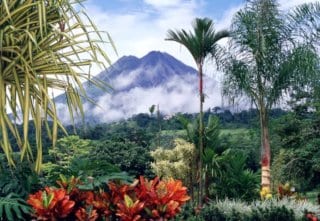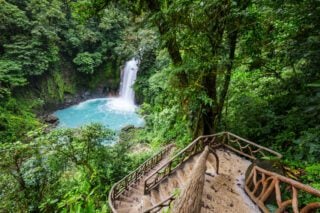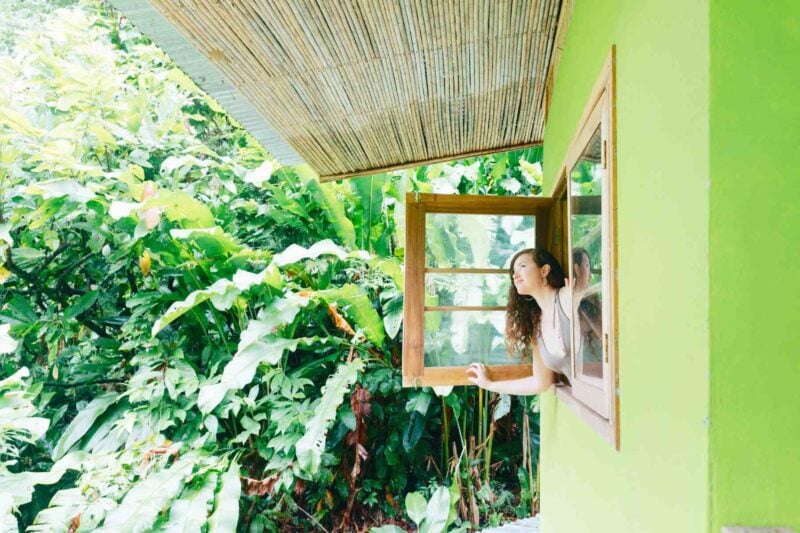
A Guide to Embracing the "Pura Vida" Lifestyle
 Whether you’re moving to Costa Rica from the USA for work, retirement, or a change of pace, this beautiful Central American country will surely impress. Not only is it known for its stunning beaches and diverse wildlife, but it also has a much lower cost of living than the United States, making it an attractive destination for those seeking an affordable lifestyle.
Whether you’re moving to Costa Rica from the USA for work, retirement, or a change of pace, this beautiful Central American country will surely impress. Not only is it known for its stunning beaches and diverse wildlife, but it also has a much lower cost of living than the United States, making it an attractive destination for those seeking an affordable lifestyle.
Fortunately, relocating to Costa Rica is relatively easy for U.S. citizens, too – especially if they already have a remote job or a steady source of income before they move. If you’re considering becoming one of the many Americans who move to Costa Rica, this article will outline everything you need to know. From visa requirements and living costs to local healthcare and the best places to call home, we’ve got you covered.
Whether you’re moving to Costa Rica from the USA for work, retirement, or a change of pace, this beautiful Central American country will surely impress. Not only is it known for its stunning beaches and diverse wildlife, but it also has a much lower cost of living than the United States, making it an attractive destination for those seeking an affordable lifestyle.
Fortunately, relocating to Costa Rica is relatively easy for U.S. citizens, too – especially if they already have a remote job or a steady source of income before they move. If you’re considering becoming one of the many Americans who move to Costa Rica, this article will outline everything you need to know. From visa requirements and living costs to local healthcare and the best places to call home, we’ve got you covered.
Legal Requirements for Moving to Costa Rica from the USA
To enter Costa Rica, U.S. citizens must apply for the appropriate visa based on their purpose of stay. Immigrants generally need the proper visa or residency permit to remain in the country. A Costa Rican tourist visa allows you to stay up to 180 days. However, if you want to stay longer, you must establish residency.
Depending on the type of visa you need, you may need to show proof of health insurance coverage before moving to Costa Rica. Therefore, it’s essential to research the specific health insurance requirements related to your chosen visa.
Unlike citizens from South American or African countries, Americans don't need to show proof of vaccination before traveling to Costa Rica. Nevertheless, checking for any updates on health regulations before your departure is always a good idea.

Find the Best International Insurance
- Compare multiple quotes and coverage options
- Work with an insurance expert at no additional cost
- Find the best plan for your needs and budget
Visa Requirements by Type
Below is an overview of the different types of Costa Rican visas and how to apply for them.
Work Visas
Unfortunately, getting a work visa in Costa Rica can be difficult due to the country’s many restrictions on foreign workers. These are in place to make sure that locals have access to jobs.
To secure a work visa, you must be hired for a position no native Costa Rican can fill. Because of this requirement, most expats who move to Costa Rica are either full-time digital nomads or people with substantial savings.
Since applications for work permits typically take three to eight months to process, it is advisable to apply early to avoid delays.
Retirement Visas
Costa Rica has a retirement visa program called the Pensionado. To qualify, you must prove that you receive retirement benefits or a steady income of at least $1,000 per month and will receive these benefits for the rest of your life.

Valid sources of income include social security benefits, pensions, retirement accounts, and annuities. Unlike many other countries, the Pensionado program has no age requirement.
Study Visas
Students who want to attend school in Costa Rica must apply for a study visa. Once they are accepted into an educational program, the school will provide them with a certificate to prove their enrollment.
You must include this certificate with your study visa application. You will also need proof that you have enough money to support yourself while studying in the country. This can be either a scholarship or a certified document from a public accountant.
Digital Nomad Visas
As of July 2024, Costa Rica is one of 66 countries offering digital nomad visas. These visas are available under the country’s Rentista program, which is open to freelancers and remote employees of companies based outside of Costa Rica.
To qualify for this visa, you must have health insurance for the duration of your stay and show proof of a minimum monthly net income of $3,000.
Read More: 31 Tips for Digital Nomads
Other Visa Options for Costa Rica
If none of the above visas seem right, you might consider becoming a “perpetual tourist.” This is a common practice among many expats in Costa Rica.
A tourist visa allows foreigners to stay in Costa Rica for up to 180 days. On the 180th day, if you leave the country for just one day, you can return the following day and begin a new 180-day stay as a tourist.
Notably, some immigrants use that time to visit their home country, while others take trips to nearby Nicaragua or Panama.
How to Become a Resident of Costa Rica
To become a resident of Costa Rica, you must first obtain temporary residency before applying for permanent residency. Both the Pensionado and Rentista programs grant temporary residency status upon visa approval.
Other visa programs may require you to apply directly for temporary residency. You can apply for permanent residency after being a temporary resident for three years.
How to Become a Citizen of Costa Rica
If you’re an American who wants to become a citizen of Costa Rica, you can do so after living there as a legal resident for seven years.
You won’t have to renounce your U.S. citizenship, either, as the U.S. and Costa Rica have an agreement that allows dual citizenship in both countries.
Is Costa Rica Safe?
According to the 2024 Global Peace Index (GPI), Costa Rica is the 58th safest country to live in, which is much higher than the United States’ position at 131. The GPI evaluates countries based on various indicators, including levels of violence, crime rates, and political stability.
Notably, Costa Rica remains the safest country in Central America, even though it faces rising issues related to violent crime and drug trafficking. The most common crimes are pickpocketing and petty theft.

Like all countries, some parts of Costa Rica are safer than others. For instance, 2024 Safety Index data from Numbeo shows that San Jose, Costa Rica’s largest city, has a Safety Index of just 55.02.
By contrast, Cartago, which is located an hour away, has a Safety Index of 51.51, while the small, coastal beach town of Jaco is 54.04. The higher the Safety Index figure, the safer the location.
Read More: The Safest Places to Live in Costa Rica
Where to Live in Costa Rica
Costa Rica offers a variety of living options, from small towns to urban environments. To help you decide where to settle, we’ve highlighted some of the best places to live in Costa Rica.
These locations were chosen based on quality of life data for some of the most popular expat cities and towns. Critical factors such as safety, cost of living, healthcare, walkability, access to nature and green spaces, and other amenities were considered.
Cartago
Once the capital city, Cartago offers a high quality of life. Its lively expat community makes it easy for newcomers to fit in. It is also known as one of the country's safest and most affordable towns.
Cartago perfectly blends history, culture, and natural beauty, including the stunning Volcán Irazú National Park. Numerous Wi-Fi cafes and co-working spaces throughout the city make it appealing to digital nomads, and its walkability makes it easy to live without a car.
Jaco
Costa Rica is famous for its beautiful beaches, and Jaco’s shoreline is one of the most charming in the country. This Pacific coastal town is also a safe and family-friendly place to live.
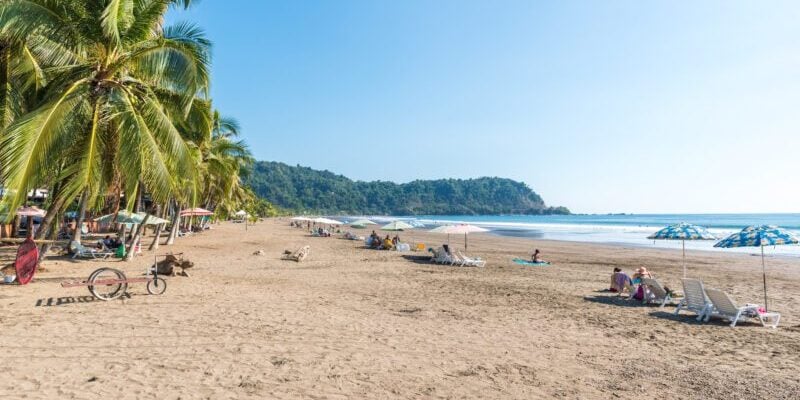
Jaco features a hip nightlife scene, excellent restaurants, volcanic sand beaches, and a thriving surf culture. There are endless outdoor activities, which is great news for expats who prefer an active lifestyle. Digital nomads also appreciate the city’s fast and reliable internet service.
Atenas
Atenas offers small-town living in Costa Rica’s Central Valley rainforest region, where some of the world’s best coffee is grown.
Perfect year-round weather and low crime rates make it a popular destination for expats, especially retirees. Due to its higher altitude, Atenas has a comfortable climate, so most homes don’t need heating or air conditioning.
Atenas and other Central Valley towns also have a lower cost of living than the country’s beach towns. The cities of San Jose and Escazú are less than an hour away, making it easy to access urban amenities.
How Much Does it Cost to Live in Costa Rica?
One of the most appealing things about living in Costa Rica is its affordability. The cost of living is much lower than in the United States, with average prices for goods and services being 52% cheaper.
Many foreigners who end up moving to Costa Rica from the USA are surprised at how little money is needed to afford housing and other essential expenses.
For instance, a one-bedroom apartment in a U.S. city center costs around $1,900 per month. In Costa Rica, a similar apartment in the city center costs only $750 on average, saving you over $1,000.
Similarly, if you look at apartments outside of a U.S. city center, the cost is about $1,590 per month. In contrast, you can find a similar rental in Costa Rica for just $540.
Read More: The Cost of Living in Costa Rica
How to Find a Place to Live in Costa Rica
Costa Rica is one of the few countries in the world that allows foreigners to buy real estate. Since property prices are significantly lower than in the U.S., many expats planning an indefinite or permanent stay prefer purchasing rather than renting.
While rentals are available throughout the country, finding long-term rentals in tourist-heavy communities can be challenging. This is because landlords often earn more from short-term rentals in these popular locations.

Local property options range from small, traditional "Tico" houses to luxurious beachfront villas. Regardless of your budget, be cautious to avoid falling victim to fraudulent real estate agents.
Be aware that Costa Rica does not have licensing requirements for real estate agents, so it's essential to find a reputable agent.
How to Find a Job in Costa Rica
Costa Rican law requires employers to give hiring preference to local candidates over foreigners. The only exception is if the employer can prove that a foreign worker is more qualified.
In most cases, immigrants must be highly skilled to compete in the job market. This is why many foreigners in Costa Rica are either retired or working as digital nomads.
The most common job sectors for expats in Costa Rica typically include:
- Information Technology (IT): Many expats work in tech, especially in roles like software development and IT support, thanks to the country’s growing tech scene.
- Tourism: Given Costa Rica’s popularity as a tourist destination, many expats find jobs in hospitality, travel agencies, and related services.
- Customer Service: This sector often requires English-speaking staff to cater to both tourists and the international community.
- English-language Instruction: Teaching English is a common job for expats, especially those with TEFL (Teaching English as a Foreign Language) certifications.
Read More: Teaching English as a Foreign Language
Banking and Finances in Costa Rica
Costa Rica's official currency is the Costa Rican Colón (CRC). However, those moving to Costa Rica from the USA will be pleased to know that U.S. dollars are accepted almost everywhere in the country.
If you plan to live in Costa Rica for more than a few weeks or months, opening a local bank account is a good idea. The process is relatively easy, but many banks require you to have residency status.
To open an account with a Costa Rican bank, you will typically need:
- Your passport
- Proof of residency
- Your phone number
- Proof of income
If you’re self-employed, you can show proof of income by providing a letter from a certified public accountant, evidence of assets from a foreign bank, or a recent bank statement.
Get our monthly newsletter filled with tips and information for people living, moving, and traveling outside of their home country.* *By submitting your email, you agree to receive monthly updates for expats, digital nomads, retirees, and more.
The Education System in Costa Rica
Studying in Costa Rica is different from studying in North America. For example, the school year in Costa Rica runs from mid-February to early December, so "summer break" happens during what many Americans consider to be winter.
Costa Rica’s high-quality public education system ranked 39th worldwide in 2024, reflecting a decent standard of education compared to other countries.
The country invests approximately 8% of its GDP in education, which is the highest in Central America. Costa Rica has a literacy rate of around 98% thanks to strong public education policies that have prioritized free education since the 19th century.
In addition to public schools, private and bilingual international schools are available, and homeschooling is also permitted. College-level students can attend one of the country’s five public universities or choose from over 50 private universities in the region.
Language and Culture in Costa Rica
Costa Ricans live by the motto "pura vida," which translates to "pure life." This saying reflects the country’s positive attitude and enjoyment of life. Many expats find it easy to adapt to the friendly and laid-back culture.
Like most countries in Latin America, Costa Rica's official language is Spanish. Learning it can help you get to know the locals and understand their way of life.
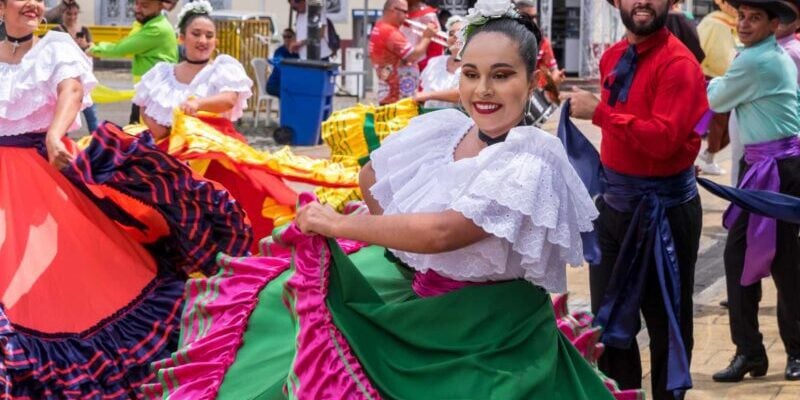
It’s a good idea to start learning the language before you arrive, as only about 10% of adults in Costa Rica speak English. While English is commonly spoken in tourist areas, knowing Spanish can help you better connect with locals.
Costa Rica has a rich culture influenced by its history and traditions. The country celebrates many festivals throughout the year, such as Fiestas de Palmares and Independence Day, which showcase local customs and traditions. Music and dance are also important, with popular styles like marimba and salsa.
Costa Rica is known for its stunning landscapes, including rainforests and beautiful beaches. These natural features are an important part of the culture, and the locals value their environment. This makes Costa Rica a perfect destination for nature lovers and those who enjoy outdoor activities.
Healthcare in Costa Rica
Costa Rica offers free, universal healthcare to its citizens and permanent residents. However, if you are a foreigner who is not a permanent resident or citizen, your best option is to buy insurance health insurance.
This is because hospitals and medical clinics in the private sector tend to offer better quality medical services, shorter wait times, and access to English-speaking staff.
It is not uncommon to wait several hours to receive medical care when using Costa Rica’s public healthcare system. However, private coverage allows you to choose an English-speaking doctor, which can help you avoid language barriers while seeking care.
There are several private plans to choose from, and costs vary depending on the provider and factors such as age and coverage level:

IMG Global Medical Plan
- Four plan options and plus optional coverages
- Choice of the coverage areas and deductibles
- Freedom to choose your health care provider

Cigna Global Medical Plan
- Flexibility to tailor plans to suit your individual needs
- Access to Cigna Global’s network of trusted doctors
- Convenience and confidence of 24/7/365 customer service
Notably, American citizens moving to Costa Rica from the USA can also apply for the following plan:

Xplorer Worldwide Medical Plan
- Premium Benefits, Coverage and Service
- Define your deductible and prescription benefits
- For Foreigners in the US or US Citizens Abroad
When selecting a plan, it’s important to compare different providers to find one that suits your needs and budget. You can read more about this in our article on health insurance in Costa Rica.
Read More: Hospitals in Costa Rica
Ready to Live the Pura Vida Lifestyle?
There’s nothing quite like the pura vida lifestyle in Costa Rica, where every day feels like a vacation. From the stunning beaches to the lush rainforests, this vibrant country offers a unique blend of natural beauty and rich culture.
With thoughtful planning, the right visa, and a solid private health insurance plan, moving to Costa Rica from the USA could be the adventure of a lifetime. Just imagine all the incredible nature, culture, and exciting experiences waiting at your fingertips!
You’ll have the chance to explore breathtaking landscapes, immerse yourself in local traditions, and meet friendly faces who embody the spirit of pura vida. Whether you’re seeking relaxation, adventure, or a fresh start, Costa Rica welcomes you with open arms!


